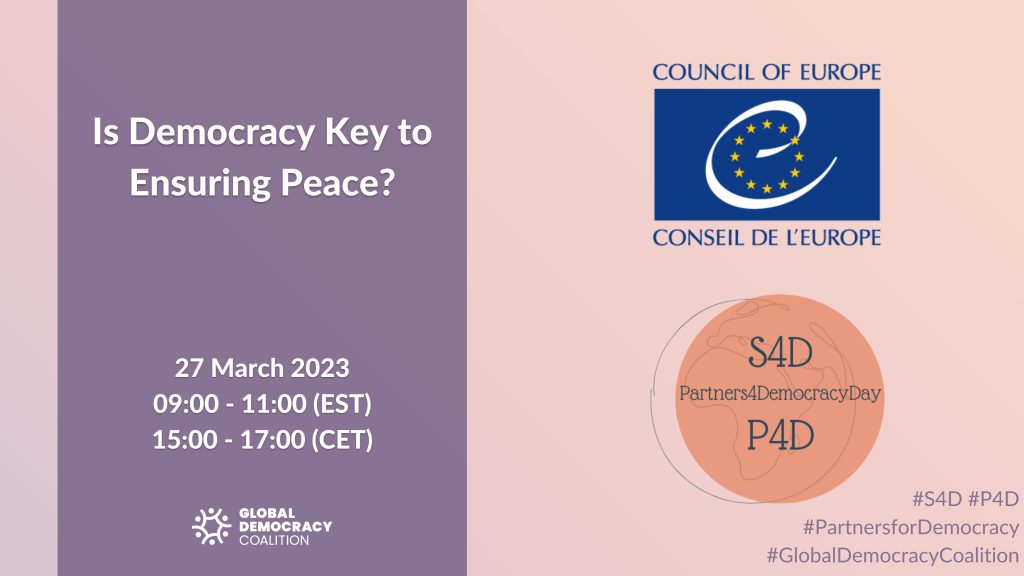
Is Democracy Key to Ensuring Peace?
Over 70 years ago, the leaders of the European states which had come together to form the Council of Europe reaffirmed their belief that justice and peace in the world are best maintained by an effective political democracy and an observance of human rights. In 2023, the phenomenon of democratic backsliding (or “attacks on democracy”, as the United States put it) and unprecedented international tensions culminating with the war in Ukraine, are prompting a number of high-level events including the holding of a Fourth Council of Europe Summit.
A well-functioning democracy with strong institutions and processes commanding peoples’ trust can be a bulwark against destructive populism, the feeding of social tensions, instrumentalised propaganda, as well as the creation of myths and simplistic solutions which at worst are centered on systematically attacking “the other” and creating imaginary villains and threats (from within and from outside the country).
– What does the perceived backsliding of democracy tell us about people’s concerns and expectations, and what are the trends? Are autocracies on the rise or on defensive?
– Is there evidence to support the belief that democracy and democratic governance are key conditions for delivering peace and security to people?
– What do recent wars tell us when it comes to their origins and impact on democracy?
– How fragile are the young democracies and what are the “stabilocracies”?
– What is the role of free media and information in contributing to democracy and peace?
– What is the role of youth, do young people want democracy?
– Is democracy backsliding or under attack? How can we better defend and promote democracy? Is it true that if we want peace we need to prepare for war?
– Can democracy – more than other governmental systems – build a culture free of fear where individuals feel confident to innovate, to progress, and to build prosperity?
– Is democracy best placed to deliver the overall feeling to people that they can genuinely influence decisions which shape their lives, and that the economic and social systems serve their interests?
– What is the role of political elites, of democratic innovations and initiatives which can help restore, build and maintain peace?
Leaving aside the democratic peace theory, this round table is designed to explore the above and other questions and identify some of the issues in the field of democratic governance which need to be priorities for those today who are working for peace in a world where there are so many strong forces pulling in the opposite direction.
Panelists and Agenda:
Moderators:
- Ms. Svetlana Geleva, Ambassador of North Macedonia, Chair of the Committee of Ministers’ Rapporteur Group on Democracy (GR-DEM)
- Mr. Paul Rowsell, Chair of the European Committee on Democracy and Governance (CDDG)
…
Work of the Parliamentary Assembly of the Council of Europe (PACE):
- Ms. Maria Mezentseva, Member of the Parliamentary Assembly of the Council of Europe and of the Verkhovna Rada of Ukraine
…
Ukraine’s struggle for Democracy and Peace:
- Ms. Orysia Lutsevych, Research Fellow and Head of the Ukraine Forum at Chatham House
- Ms. Dina Klymyuk, European Democracy Youth Network
- Ms. Karina Grodetska, European Democracy Youth Network
..
Importance of democratic institutions and lessons from the Balkans:
- Mr. Ivan Vejvoda, Permanent Fellow, Head of Europe’s Futures – Ideas for Action, Institute for Human Sciences, Austria
…
Role of the free media and information to promote Democracy and Peace:
- Ms. Dragana Obradovic, executive director for Serbia of Balkan Investigative Reporting Network (BIRN), manager of the Reporting Democracy project
…
The hopes from Younger generations for Europe:
- Ms. Armine Movsesyan, International Movement of Catholic Agricultural and Rural Youth, Head of the portfolio on youth, peace and security of the Council of Europe’s Advisory Council on Youth
- Democratisation programmes and policies:
- Mr. John Glenn, Senior Director, International Forum for Democratic Studies, National Endowment for Democracy
- Mr. Richard Youngs, Senior Fellow, Democracy, Conflict and Governance Program, Carnegie Europe
..
